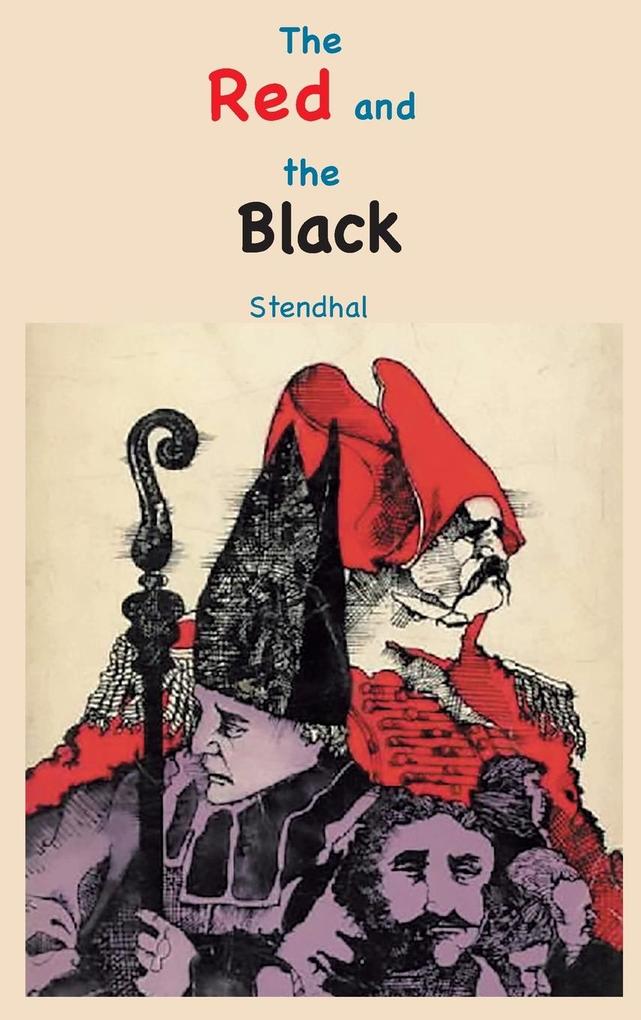
Zustellung: Do, 21.11. - Mo, 25.11.
Versand in 1-2 Wochen
VersandkostenfreiBestellen & in Filiale abholen:
Le Rouge et le Noir is the Bildungsroman of Julien Sorel, the intelligent and ambitious protagonist. He comes from a poor family and fails to understand much about the ways of the world he sets out to conquer. He harbours many romantic illusions, but becomes mostly a pawn in the political machinations of the ruthless and influential people about him. The adventures of the hero satirize early 19th-century French society, accusing the aristocracy and Catholic clergy of being hypocritical and materialistic, foretelling the radical changes that will soon depose them from their leading roles in French society.
The first volume's epigraph, "La vérité, l'âpre vérité" ("The truth, the harsh truth"), is attributed to Danton, but like most of the chapters' epigraphs it is actually fictional. The first chapter of each volume repeats the title Le Rouge et le Noir and the subtitle Chronique de 1830. The title refers to the contrasting uniforms of the army and the church. Early in the story, Julien Sorel realistically observes that under the Bourbon Restoration it is impossible for a man of his plebeian social class to distinguish himself in the army (as he might have done under Napoleon), hence only a church career offers social advancement and glory.
In complete editions, the first book ("Livre premier", ending after Chapter XXX) concludes with the quotation "To the Happy Few" from The Vicar of Wakefield by Oliver Goldsmith, parts of which Stendhal had memorized in the course of teaching himself English. In The Vicar, "the happy few" read the title character's obscure and pedantic treatise on monogamy-alone.
The title is taken to refer to the tension between the clerical (black) and secular (red) interests of the protagonist. But it could also refer to the then-popular card game "rouge et noir," with the card game being the narratological leitmotiv of a novel in which chance and luck determine the fate of the main character.
The first volume's epigraph, "La vérité, l'âpre vérité" ("The truth, the harsh truth"), is attributed to Danton, but like most of the chapters' epigraphs it is actually fictional. The first chapter of each volume repeats the title Le Rouge et le Noir and the subtitle Chronique de 1830. The title refers to the contrasting uniforms of the army and the church. Early in the story, Julien Sorel realistically observes that under the Bourbon Restoration it is impossible for a man of his plebeian social class to distinguish himself in the army (as he might have done under Napoleon), hence only a church career offers social advancement and glory.
In complete editions, the first book ("Livre premier", ending after Chapter XXX) concludes with the quotation "To the Happy Few" from The Vicar of Wakefield by Oliver Goldsmith, parts of which Stendhal had memorized in the course of teaching himself English. In The Vicar, "the happy few" read the title character's obscure and pedantic treatise on monogamy-alone.
The title is taken to refer to the tension between the clerical (black) and secular (red) interests of the protagonist. But it could also refer to the then-popular card game "rouge et noir," with the card game being the narratological leitmotiv of a novel in which chance and luck determine the fate of the main character.
Produktdetails
Erscheinungsdatum
20. Januar 2022
Sprache
englisch
Seitenanzahl
472
Autor/Autorin
Stendhal
Verlag/Hersteller
Produktart
gebunden
Gewicht
913 g
Größe (L/B/H)
235/157/32 mm
Sonstiges
HC gerader Rücken kaschiert
ISBN
9781950330973
Entdecken Sie mehr
Bewertungen
0 Bewertungen
Es wurden noch keine Bewertungen abgegeben. Schreiben Sie die erste Bewertung zu "The Red and the Black" und helfen Sie damit anderen bei der Kaufentscheidung.









